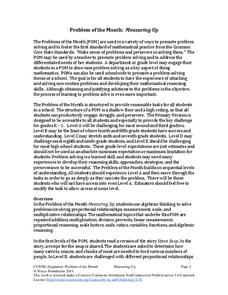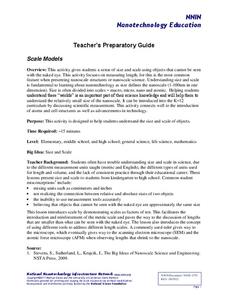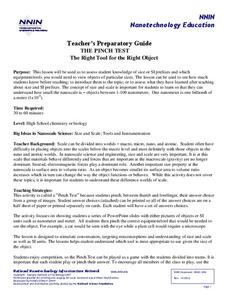EngageNY
Relating Scale Drawings to Ratios and Rates
Enlargements and reductions are all about scale. The lesson introduces scale drawing to the class. Pupils determine whether the drawing is a reduction or an enlargement, and the constant of proportionality between the original and the...
NASA
Solar System Scale & Size
Use a variety of whole fruits to represent the different planets in the solar system to introduce scale sizes to your math or space science class. They follow suit by creating a non-scaled model of the solar system using specific-colored...
PBS
Scale City — Scaling up Recipes and Circles in the Real World
What a great big skillet you have. The resource introduces the class to the world's largest stainless steel skillet. The class creates a model of the skillet and a typical 12-inch skillet and compares the relative sizes of their areas....
Curated OER
Probability Scale 0 to 1
Use a probability scale line to help introduce learners to odds and probability. They start by examining an example line, looking at where events would fall from 100% probability to 0%. Next, learners complete two of these on their own,...
EngageNY
Computing Actual Areas from a Scale Drawing
Square the scale factor when working with scaled drawings and area. The 19th lesson in a series of 22 introduces calculating actual areas from scale drawings. The lesson encourages pupils to use the square of the scale factor to find the...
Curated OER
Orienteering - Lesson 1 - Maps & Map Scales
Lesson 1 of 10 lessons in this orienteering unit is about maps and map scales. After all, orienteering is all about maps, compasses, and finding ones' way around. It is imperative to be able to read maps and understand the relevance of...
Curated OER
Scaled Measurements
Introduce youngsters to the concept of scale measurement and the uses of scale drawing. They are provided with an explanation and then given two examples of how scale measurements work. This would be a good resource to use prior to...
EngageNY
Making Scale Drawings Using the Ratio Method
Is that drawn to scale? Capture the artistry of geometry using the ratio method to create dilations. Mathematicians use a center and ratio to create a scaled drawing. They then use a ruler and protractor to verify measurements.
Noyce Foundation
Measuring Up
Teach the basics of measurement and conversion with a five-lesson resource that builds an understanding of proportion and measurement conversion from elementary through high school. Initially, young scholars use ratios to determine soup...
Curated OER
Geologic Time Scale Analogy
Students examine geologic time to scale. In this geologic time lesson, students create a time-scale metaphor that shows some of the Earth's important events. Students present their metaphor to the class.
National Nanotechnology Infrastructure Network
Scale Models
With instructions to adapt the activities for any grade K-12, any teacher can incorporate the concept of scale into the classroom with a simple, yet effective lesson.
Learning Games Lab
The pH Scale and Meter Calibration
What are the different ways to test for pH? First, scholars explore the pH scale and a common way to test for acidity and alkalinity. Then, they learn about the importance of pH in food safety and why variance in pH could potentially...
Illustrative Mathematics
How Many Leaves on a Tree?
This is great go-to activity for those spring or fall days when the weather beckons your geometry class outside. Learners start with a small tree, devising strategies to accurately estimate the leaf count. They must then tackle the...
West Contra Costa Unified School District
Solving Equations Using Balance Scale, Decomposition, and Graphing
There's more than one way to solve an equation — three, actually. Scholars learn how to solve simple linear equations in one variable using three different methods, which include using balance scales, using decomposition (e.g., turning...
Curated OER
Map Scale
Third and fourth graders are introduced to the concept of map scale. Using an illustration, they discuss if it shows the actual size of the object and why scale is used to represent areas. They use some items in the illustration to...
Curated OER
Acrylic Painting Value Scales
So, you're about to get out the acrylics and you need a way to introduce hue, shades, and value scale when painting. Lucky for you this worksheet provides instruction and two scales for your class to use for practice!
Skills Workshop
Ratio, Scale, and Proportion
Converting units is an excellent example of how math relates to our everyday tasks. The resource prompts mathematicians to use baking, cooking, and other daily activities to discover how to make larger quantities of...
Curated OER
Mapping
Introduce middle or high schoolers to topographic maps with this PowerPoint. After a review of longitude and latitude, display and describe contour lines and intervals. Also explain map scale. This is a useful presentation for a social...
National Gallery of Canada
Build a City of the Future!
Tap into your pupils' imagination by asking them to design futuristic, ideal cities. They must discuss and take scale and size into account, looking at some model pieces of art for inspiration and analysis. The final product for each...
Curated OER
Mapping It Out: Social Studies Online
A great way to introduce 2nd graders to map skills would be to use this presentation. The visuals are inviting and the layout is easy to understand. This would be a terrific way to cover the basics on how to read a map. There is also a...
Curated OER
Introduce Vocabulary: Our Family Tree: An Evolution Story (Peters)
Lisa Peters presents macroevolution as a large-scale family tree in her book Our Family Tree: An Evolution Story. She suggests the process from single-celled organisms to modern-day humans, and learners explore new vocabulary...
Curated OER
Geologic Time Scale II
Students research the geologic time scales and the appearance of animals and plants during these eras. They complete a chart indicating the era, period and major events.
National Nanotechnology Infrastructure Network
The Pinch Test
Test your pupils' understanding of the scale from macro to atomic. While displaying images of different materials, learners identify what they would need to make that material visible. Their choices range from the human eye to an...
US Department of Commerce
Looking at Numbers of Births Using a Line Graph
Was there a baby boom? Using census data, class members take a look at the number of 8-11 year olds and determine their birth years. Scholars create a double line graph to compare the number of births for two states for several years....























